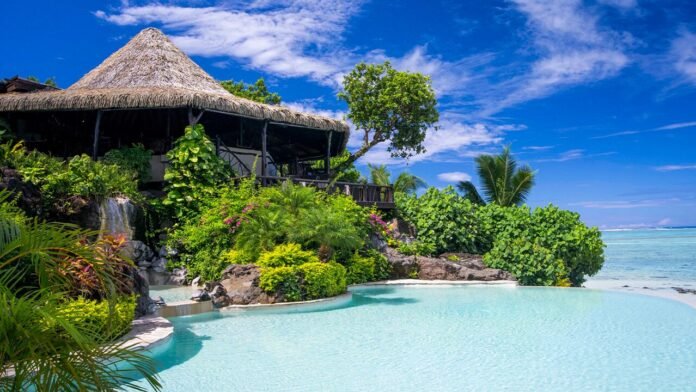The Cook Islands is proving that sustainable tourism isn’t just a possibility – it’s a necessity. This South Pacific paradise is preserving its natural beauty for future generations through a combination of ancient traditions and modern conservation practices.
A Glimpse of Timeless Paradise on Rarotonga
Landing on Rarotonga, the largest island in the Cook Islands chain, felt like stepping back in time. As we rode a taxi from Rarotonga airport, the absence of high-rise hotels, fast-food chains, and corporate establishments was immediately apparent. Instead, we were greeted by coconut palms, the scent of salt and frangipani, and a seamless blend of jungle and ocean views. This authentic, uncrowded, and laid-back atmosphere is reminiscent of Hawaii in the 1960s.
A local taxi driver pointed out a low-slung resort along the shoreline, explaining, “No building can be higher than a coconut tree.” This rule isn’t just tradition – it’s law, set in 1965 by the Cook Islands’ first premier, Albert Henry, to prevent overdevelopment. By ensuring that only Cook Islanders can own land, large corporations are kept at bay, and hotels blend naturally into the landscape alongside white-sand beaches and verdant parks.
Commitment to Sustainable Tourism and Conservation
Cook Islanders have made a conscious effort to protect their environment. Instead of following the overdevelopment trends seen in many tourist destinations, the islands have embraced sustainable tourism practices that benefit both locals and visitors. Jeremy Goodwin, regenerative tourism manager for the Cook Islands Tourism Corporation (CITC), explains, “People come here because it is a paradise uncluttered by overdevelopment. Our sacred duty as custodians of the land is to look after our paradise.”
This commitment extends to marine and terrestrial conservation. Traditional methods like the Ra’ui System—where access to resources is restricted for a period—continue to play a vital role in preserving food supplies and ecological balance in lagoons, reefs, and coastal areas. On the remote island of Pukapuka, locals have practiced sustainable living for centuries, moving seasonally between atolls to prevent resource depletion and maintain a delicate balance with nature.
Eco-Friendly Accommodations and Green Initiatives
At The Rarotongan Beach Resort and Lagoonarium, guests are welcomed with a warm “Kia Orana” – a traditional greeting meaning “may you live long.” Overlooking the Aroa Lagoonarium, this eco-friendly resort supports marine conservation by serving as both a coral nursery and a protected habitat for marine life, including butterflyfish, parrotfish, and angelfish.
The islands promote sustainable dining as well. At the popular Muri Night Market, vendors serve local dishes such as ika mata (raw fish marinated in lime and coconut milk) and rukau rukau (taro leaves in coconut cream) using locally sourced ingredients. Initiatives like the Rent-a-Plate project encourage visitors to use reusable plates and cutlery, reducing plastic waste. Additionally, free UV-treated water stations, led by the Te Ipukarea Society, provide refillable bottles to minimize single-use plastics.
Global Leadership in Marine Conservation
The Cook Islands are at the forefront of marine conservation. In 2017, they established the Marae Moana Marine Park, the world’s largest multi-use marine protected area, covering 1.9 million square kilometers. This groundbreaking legislation bans large-scale commercial fishing and seabed mining within 50 nautical miles of each island, ensuring the long-term health of the marine ecosystem.
On neighboring Aitutaki, known for its snow-white sand beaches and crystal-clear lagoons, the Pacific Resort Aitutaki has launched a coral restoration project. Guests can participate by affixing coral fragments to underwater mesh tables, helping regenerate the reef—a project that embodies the concept of Mana Tiaki, or sacred guardianship.
Preserving Paradise for Future Generations
Every day, Cook Islanders live by the philosophy of leaving both the people and the place better than they found it. From pristine, uncrowded beaches like Aroa Beach and Titikaveka Beach to sustainable practices in local fisheries and agriculture, the islands offer a blueprint for eco-friendly travel and sustainable tourism. As Karla Eggelton, CEO of CITC, explains, “Our preservation efforts blend traditional wisdom with modern environmental initiatives to ensure that this paradise endures.”
Whether you’re exploring the powdery white sands of Rarotonga or snorkeling among vibrant marine life in Aitutaki, the Cook Islands offer an authentic, sustainable travel experience that proves protecting our planet can be both practical and essential.




